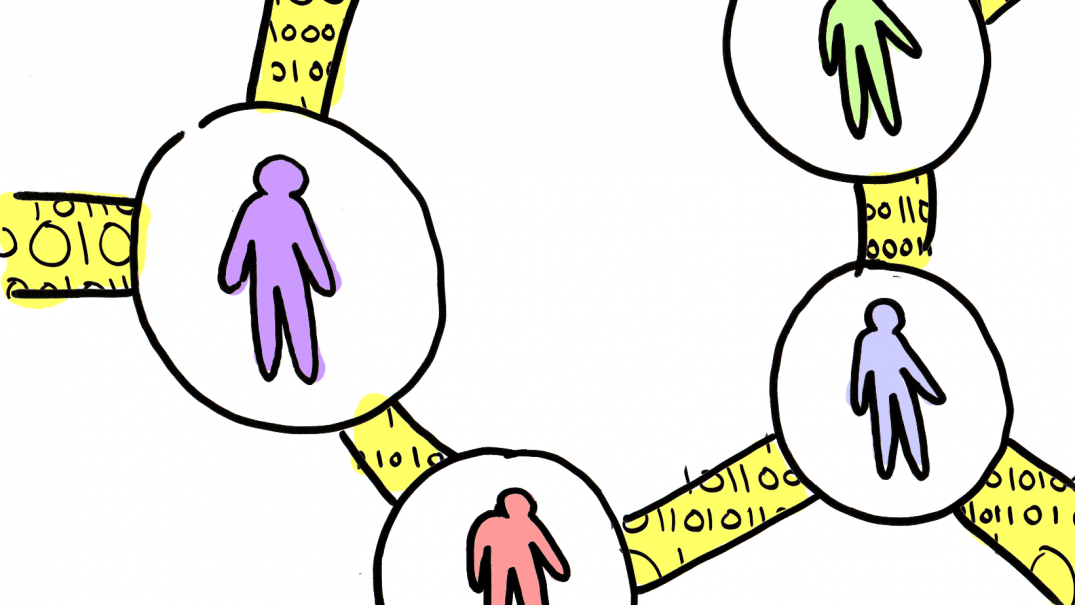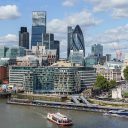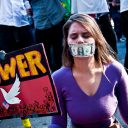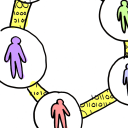Own everything!

Image: Jonny Goldstein, CC BY 2.0
A disaster such as the Grenfell fire does not happen because one person made a mistake. Many safeguards should be in place to prevent such a catastrophic event. A Grenfell fire happens then when an entire system fails. As we await the details of the system failure the inquiry must reveal if it is not to be a whitewash, it seems a good moment to think about other system failures that currently face us. Millions going to food banks or unable to afford decent housing in one of the richest countries in the world reveals a system failure. An epidemic of mental health problems reveals a systems failure. An inability to deal with climate change reveals a systems failure. A constant anger at government and at the institutions of government, channelled – largely ineffectually – through ballot boxes, reveals a systems failure.
Any way of talking about this failure must resonate with people’s experience, and also implicitly offer an alternative. What is visibly failing is management of large scale societies, management of us, by those who seldom fully understand our problems, management regimes too big to adapt as needed. It is not stated often enough that we live in a heavily managed society. Yet people instantly understand what is meant by this; they have experience of being managed. Sometimes we are managed well, sometimes badly, but at some point in a large system, the former state will always give way to the latter. Eventually a sense of lost control comes over us all. We must take back control, we feel. It is hard to know how, hard to know who to target, for no leaders or parties seem to return power to us.
Many see that capital has become a dominant force in these large systems, re-shaping our cities, our very lives, flinging aside humans as detritus of the development process. Yet as a solution we are constantly offered better management of ourselves. We can keep casting around for better managers, but as the ‘Accidental Anarchist’ Carne Ross has been arguing, we live in complex systems that cannot successfully be controlled from the top down. The point is not to simply be angry with the managers for doing the wrong things, or for being the wrong managers, or for not advantaging us rather than others in these huge dynamic networks around us. Intention anyway becomes lost in such large systems. It’s true that some managers do transfer wealth from poor to rich, and others attempt to do the opposite. But each of the managers fails at some point, often fatally undermining any good work they have done. So perhaps it’s time to start entertaining a new line of thought: perhaps we should stop asking to be managed.
This requires a deep shift in thinking and a new set of institutions. Almost all previous political claims, from both left and right, assumed that people must be managed. Elections every four or five years do not undo management: elections are a method by which we find the correct managers, not a form of self-rule. Those who think that a single decision every four or five years means we are in control are invited to reflect on the absurdity of the proposition: mere ownership of your house involves dozens, even hundreds of decisions in a year. How then can ownership of your government require fewer decisions?
Why have I begun talking about ownership? It isn’t the usual language of making democracies work, except in that vague and dishonest usage where we are encouraged to ‘feel ownership’ of decisions made by others. Socialism and communism did once talk about ownership but created a dichotomy between private ownership and central state ownership. Neo-liberalism bought into the same dichotomy and propagandised private ownership, or sometimes mixed forms of the two in unwieldy pseudo-free markets. It feels like we have not had a thorough, open-minded discussion about ownership for a long time. Doing so might begin to answer the question of how those of us dissatisfied with current institutions can picture what new institutions might look like.
Ownership, stripped back to its real meaning, is about control, and control is what we lack. The point of owning something is that we can do as we wish with it. To be made to feel ownership is a con, but to have ownership is to have control. The logical conclusion is that we should have ownership of as much of the world we inhabit as possible. Others have reached this conclusion before: digging at the practicalities of Lefebvre and Harvey’s ‘right to the city’, which sounds a little ambiguous in its meaning, it emerges as something like a ‘right to own the city’. We should have control, says Harvey, not just of public space, but of our housing, our energy sources, our data infrastructure, our food supplies and of course our workplaces.
This sounds difficult, and it is. Owning our world would share some of the problems of managing it: our world is so big, there is too much of it and too many of us. Yet what an ownership framework offers that management does not is that it works at multiple scales, rather than being always top down and so concerned with controlling entire systems. Where an overview is required – owning our atmosphere for example – we can construct decision-making systems that allow all to take part, but where detail is required we can conceive of much more localised forms of ownership, in which those most affected have the most say.
Breaking with management in favour of ownership means that if it affects your life, you should be able to have a say in it. This isn’t an entirely radical idea – even private ownership of property in our current capitalist system is compromised by the imposition of planning laws. ‘Compromise’ sounds like a bad word, but here it is a recognition that what people do to their properties has a public impact, so there should be some level of public control over this most private of ownership forms. Where the planning rules fall down in the UK is that local authorities and the planning system are astonishingly undemocratic, yet the underlying principle is established: in this most capitalist of societies we already recognise that we need some sort of collective, democratic control of our environment, and that it can take mixed individual/democratic forms.
We could extend the principle of ownership to workplaces, transport networks, open space, housing, rent levels, mobile phone companies, media bodies, power provision, foreign policy, money, and any area of life where we feel the decisions made affect us. Ownership and democracy are closely overlapping ideas. What ownership means is that we decide, what democracy means is that where we must make decisions together there is a process in place for that to happen. A call to own everything is a call for a democratic society.
Emerging technologies are making it easier for more people to be involved in discussion and decision-making. Taiwan and radical Spanish cities are currently experimenting with intense public participation in creating legislation, and it’s only a matter of time until other countries follow suit.
A further piece of the puzzle of how to make ownership work is that we must understand the concept of blended ownership, different types of ownership, overlapping ownership rights for different scale collectivities, all imagined beyond the private-state dichotomy. The recent Labour Party-commissioned paper Alternative Models of Ownership divided forms of ownership into worker co-ops, municipal and community ownership, and forms of state ownership with increased democratic accountability, but the commons of old that are inspiring many to establish new commons today often had very complex ownership and usage structures that endured over centuries. We should aim to construct what I call full spectrum ownership, that is to say, an infinite variety of ownership types and overlapping ownership forms designed to give us control over our own lives.
I will return to housing for a practical example of how the right to own the city (and everything else) could work. We could escape from the dichotomy of privately owned homes versus publicly owned homes, and instead establish systems in which the individual would have ownership rights, yet the surrounding community would also have rights, perhaps to regulate the re-sale price or rents, as though the entire city or country were a network of community land trusts. In order to prevent islands of privilege developing, regional and national ownership bodies would also exercise some rights within a neighbourhood. Again, this isn’t a million miles from how the planning system works now, but this would need democratic bodies at every level, starting from the street or neighbourhood up, to regulate the system, rather than a central government prodding bureaucratic local authorities to try to get the results they want. There would be room for representation, though more democratic than our current system, with delegates who can be recalled at any time, but there might also be a place for citizen juries in order to grapple with complex policy issues.
I’m under no illusions that creating a culture of ownership is an easy thing to do, even if we do have a major party interested in ownership once again. Education is a key method for changing culture, and education for ownership needn’t be restricted to children. A cultural shift would require a large scale education initiative to begin to educate people for working together. This is, admittedly, somewhat top-down, and so might be the establishment of local and regional councils and other new structures. Changing our current society will inevitably require a compromise with old methods. The way we have been taught to behave up to now was also imposed from the top down. We cannot avoid the tension of the fact that undoing this will sometimes require the use of top-down methods. What resolves the tension a little is that we will be attempting to undo the damage of the past together, we will be establishing ownership as we work, using discredited institutions to create new democratic institutions. To own together is to live together, to undo the atomised society that management has given us, to create, as I have argued elsewhere, a more caring society. A more convivial world could be seen as a by-product of taking back control, but it could be seen as potentially the best outcome of a culture of ownership.
If we were to embark on such a vast project it would be hard to know where to start. Thankfully we wouldn’t be starting from scratch. The world of cooperatives has always been the ideal training ground for those who want to run the world together. Co-ops’ radical potential is not that they eliminate the dominance of capital in themselves, but that they prepare us for a world that we control. They teach us what a liveable system might look like.
In campaigning work too we could begin to assert a culture of ownership. I am involved with a campaign to fight for renters’ rights in London. The radical approach to this, it seems to me, is to ask whether renters shouldn’t have partial ownership rights over the properties they inhabit. It may sound too radical put like that, but Germany, with its indefinite tenancies and high level of rights for renters, already gives the tenant much more power over their property. What is that but a transfer of some ownership rights to the tenants? A renters union, as envisaged by the nascent Renters Power Project, is a way to collectively achieve this. Real democratic council tenant power, of interest to some residents of Lancaster West, the estate encompassing Grenfell Tower, offers a similar promise that people might have ownership of where they live.
At the more governmental level, what would the world look like if we started acting as though we owned everything? What if we identified as owners and began to assert full spectrum ownership of our world? We could begin to challenge those who think they own everything now, and at the same time gain practice in working and owning together. We would spend more time interacting with our neighbours, with those who share our interests, and interacting as equals rather than as bosses and subordinates. The journey to ownership is bound to be a long one, but we needn’t await arrival at the destination to begin living in a more controllable and more convivial world.






